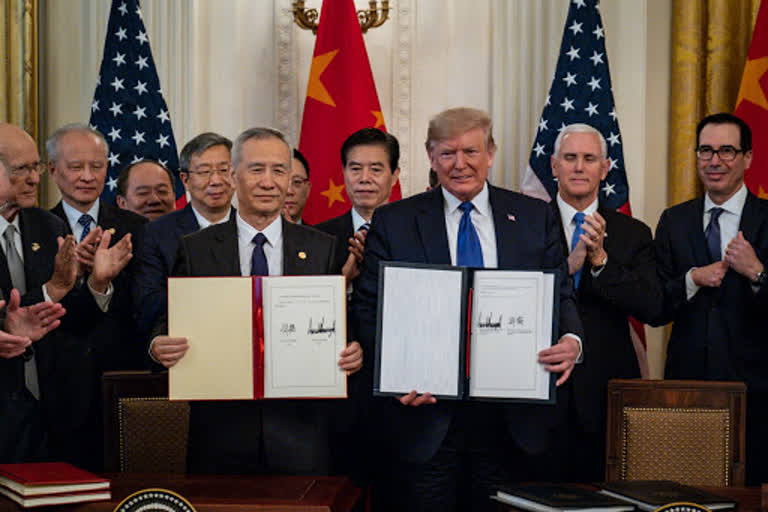Washington: US President Donald Trump on Wednesday refused to roll back the massive tariff imposed on import of Chinese goods despite having succeeded to sign the first phase of a trade deal with China.
During a historic signing ceremony at the White House, Trump said he will roll back the tariffs only if the second phase of the trade deal is signed between the two economic giants.
The trade deal, considered as a major political and diplomatic victory for President Trump, came on a day when the House voted to sent his impeachment trial to the Senate. Trump has used tariff as leverage in trade talks with major economic powers of the world, mainly China.
Trump asserted that he will continue with his policies on tariffs.
"We are leaving tariffs on which people are shocked but it's great but I will agree to take those tariffs off if we are able to do phase 2. In other words, we are negotiating with the tariffs," Trump told the audience, which besides his cabinet colleagues and lawmakers included who's who of the American corporate sector.
"We have 25 per cent on USD 250 billion worth of goods and then we are bringing the 10 per cent down to 7.5 per cent on USD 300 billion worth of goods plus," he said.
"So I am leaving them on because otherwise, we have no courts to negotiate with than negotiating with (Chinese Vice Premier) Liu He, is very tough but they will all come off as soon as we finish phase 2 and that will be something that some people on Wall Street will love but from what I see they love this deal the way it is now,” Trump said.
Describing the trade deal as more than an agreement, he said: "This marks a sea change in international trade".
"At long last, Americans have a government that puts them first at the negotiating table 1st in trade, first in every deal, every decision and every action we take a long with incredible enforceability," he said.
"As we move on to phase 2, I look forward to continuing to forge a future of greater harmony, prosperity and really commerce, commerce and far beyond commerce between the United States and China," said the US President.
"This is something that far beyond even this deal it is going to lead to an even stronger world because we now have -- we now have a big investment in each other and in getting along with each other and this deal is phase one," he said.
Trump said there will be no phase 3.
"This is something that is going to be so special however to our manufacturers, our farmers, our bankers, our service people," he said.
The first phase of the trade deal signed by the US with China marked the conclusion of more than a year of tough negotiations including several months of suspension of talks between the two largest economies of the world.
The first phase of the trade deal includes Intellection Property (IP) Protection and Enforcement, ending forced technology transfer, a dramatic expansion of American agriculture, removing barriers to American financial services, ending currency manipulation, rebalancing the US-China trade relationship and effective dispute resolution.
Read more: Budget Session of Parliament to commence on Jan 31



